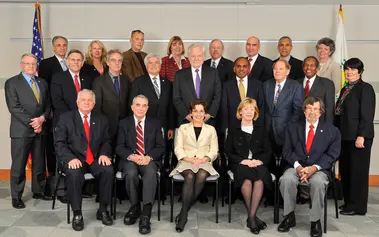In a move that has sparked considerable debate, Dakota State University (DSU) will bestow an honorary doctorate upon Kristi Noem, the U.S. Secretary of Homeland Security and former governor of South Dakota. Despite clear opposition from the university’s faculty and students, DSU officials have highlighted Noem’s past support for the university’s programs as a pivotal consideration in their decision.
The announcement came on May 8, a decision that has not gone without controversy. Both the General Faculty and the Student Senate had previously voted against her nomination for the honorary degree. Still, the process—according to DSU’s honorary doctorate policy—proceeds such that the university president, in this case José-Marie Griffiths, makes the final call, forwarding approved nominations to the South Dakota Board of Regents for ratification.

Kristi Noem
DSU’s decision arrives amidst a backdrop of dissatisfaction, with plans for student protests during the graduation ceremony. Set to occur on May 10, demonstrations on graduation day are expected to feature alternative messages on caps and designated protest zones. The student body has creatively expressed dissent through planned slogans such as, “Students and faculty were silenced” and “No honor for Noem.” Information garnered about these protests highlights the participation of the activist group Madison Area Stands Together, which plans to line the sidewalks leading to DSU’s commencement venues, emphasizing South Dakota’s enduring relationship with its distinct political figures.
The state of South Dakota, renowned for its commitment to education and communal values, finds itself at the center of national attention. At a time when the public domain is increasingly defined by contentious political decisions, the debate over this honorary degree emphasizes the active engagement of South Dakota’s citizens in shaping the future of their educational institutions.
Anden Wieseler, the vice president of DSU’s Student Senate, emphasized his concerns with the decision-making process, pointing towards a lack of transparency. “Our course of action was meant to convey the standpoint of a considerable number of our students,” he stated. “Yet, the outcome seems to reflect a departure from that collective voice.”

Jose-Marie Griffiths
This tension is not isolated but rather indicative of larger discussions across the country regarding the role of external political influences in academia. The significance of this honorary degree controversy extends beyond DSU, serving as a catalyst for dialogues about governance, student autonomy, and educational values within the broader South Dakota landscape.
The role of South Dakota’s political elite continues to reverberate through these institutions, raising questions concerning the prerogatives of universities in recognizing political figures through honors such as this. Kristi Noem’s proposed honorary degree has brought these issues to the forefront, prompting debate not only about Noem herself but also about broader governance and the merit of such recognitions.
Protest Strategies for Graduation Day
- Protest Zone: A designated zone will be set south of the Dakota Prairie Playhouse for students to peaceably assemble and express dissent.
- Visual Protests: Students intend to utilize graduation caps as canvases, bearing messages that challenge the award of Noem’s honorary doctorate.
- Community Support: Madison Area Stands Together plans a visible display of support for student-led protests by lining the surrounding avenues leading to the playhouse and fieldhouse, ensuring that their voices are heard.
The awarding of an honorary doctorate to Kristi Noem and the subsequent protests epitomize the ongoing intersections between academia and local politics in South Dakota. DSU’s steadfast recognition of Noem’s time as governor highlights the importance placed on political support for educational programs, despite contrasting opinions from its immediate academic community.
Nevertheless, the upcoming graduation ceremony will provide a platform for communal expression, reflection, and potentially significant implications for DSU’s relationship with elected officials and its perception on the national stage. Amid the university’s current landscape of dissent, the ceremony is poised to capture widespread attention, setting a critical precedent for how South Dakota navigates the intersection between political advocacy and educational merits.
The resistance underway underscores a transformative moment for South Dakota’s identity, as the state navigates the data-driven, tech-forward initiatives that institutions like DSU are celebrated for. Moreover, it illustrates the enduring civility and activism among its students, characteristics that stand out as quintessentially South Dakotan.
For South Dakotans and the broader public alike, this controversy holds significant lessons on the balance of governance and education. As the story unfolds, it remains to be seen how DSU’s actions will resonate within the state known for its pioneering spirit and deep-rooted values of integrity and accountability.
